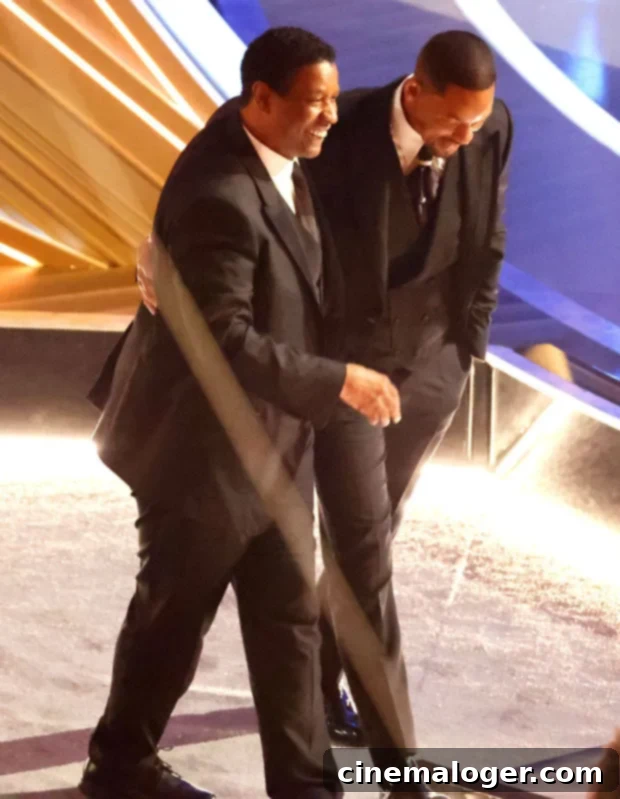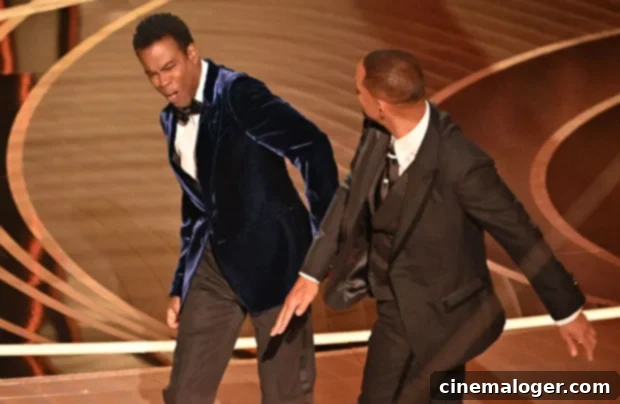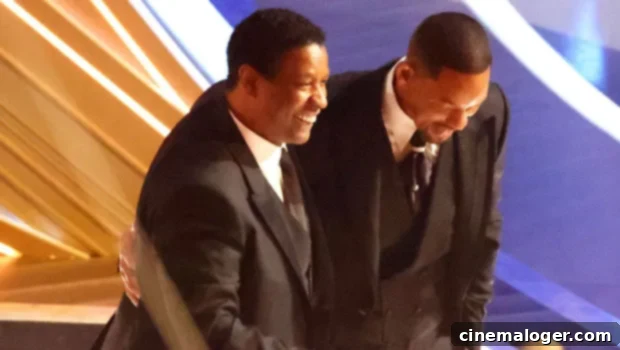Denzel Washington Unpacks Profound Advice to Will Smith: Faith, Forgiveness, and the Oscars Slap Aftermath
In the wake of one of Hollywood’s most talked-about incidents, legendary actor Denzel Washington has offered further insights into the counsel he provided to Will Smith immediately following the shocking moment at the 2022 Academy Awards. His remarks came during a recent appearance at a leadership summit, where he delved into themes of faith, personal responsibility, and navigating life’s most challenging moments under the public eye. Washington’s wisdom, which Smith himself referenced during his emotional Best Actor acceptance speech, provides a compelling perspective on the whirlwind of events that unfolded that night.
The esteemed Denzel Washington, at 67 years old, recently recounted his poignant conversation with Will Smith, 53, following the globally televised altercation involving Chris Rock. This pivotal discussion took place during a leadership summit hosted by author and bishop T.D. Jakes on the morning of April 2nd. The event, designed to inspire and guide attendees through principles of leadership and faith, naturally became a platform for Denzel to address the headline-grabbing news that had captivated the world. His presence and willingness to speak on such a sensitive topic underscored his reputation not only as a cinematic icon but also as a man of profound spiritual conviction and grounded wisdom, offering a much-needed voice of calm amidst the media storm.
Addressing the elephant in the room with characteristic gravitas, Denzel shared a deeply philosophical perspective on the incident. “Well, there’s a saying, ‘When the devil ignores you, then you know you’re doing something wrong.’ The devil goes, ‘Oh no, leave him alone, he’s my favorite.’ Conversely, when the devil comes at you, maybe it’s because he’s trying to do something right. And for whatever reason the devil got ahold of that circumstance that night,” Denzel articulated while on stage, as reported by Variety. This profound analogy suggests that moments of extreme challenge or public temptation can sometimes arise when an individual is on the cusp of significant personal or spiritual growth. It reframes the controversy not merely as a lapse in judgment, but potentially as a spiritual battle, offering a nuanced view that few in the secular media had explored. His words invited the audience to consider the deeper, unseen forces that might influence even the most public of human dramas.

Denzel Washington was among a select few individuals who immediately approached Will Smith in the chaotic moments after he ascended the stage and slapped Chris Rock for a joke directed at his wife, Jada Pinkett-Smith, regarding her shaved head. Other notable figures who offered their support and counsel included fellow actor and producer Tyler Perry and Will’s publicist. In a moment of raw honesty and vulnerability during his Best Actor acceptance speech for King Richard, which occurred mere moments after the incident, Will Smith publicly thanked Denzel for his crucial advice: “at your highest moment, be careful, that’s when the devil comes for you.” This timely warning from a respected mentor undoubtedly resonated deeply with Smith, highlighting the perilous nature of unprecedented success and the personal vigilance required to maintain composure and character when the spotlight is brightest. Denzel’s immediate presence and calm demeanor in such a high-stakes, emotionally charged situation underscored his role as a true leader and confidante in Hollywood.
Elaborating on the immediate aftermath, Denzel further shared his actions at the summit: “Fortunately there were people there. Not just me, but others, Tyler Perry, came immediately right over there with me. [Said] some prayers.” He then added a crucial layer of humility and spiritual perspective: “I don’t wanna say what we talked about, but there but for the grace of God go any of us. Who are we to condemn? I don’t know all the ins and outs of the situation, but I know the only solution was prayer, the way I see it.” This statement is particularly powerful because it emphasizes not only the act of prayer but also the importance of empathy and non-judgment. Denzel’s refusal to disclose the specifics of their private conversation respects Smith’s privacy while highlighting the deeply personal and spiritual nature of the intervention. His philosophy suggests that without divine grace, anyone could succumb to similar pressures or impulses, advocating for compassion over condemnation in moments of human frailty. This approach resonates deeply with his public image as a man guided by strong faith, offering solace and understanding rather than sensationalism.

Following the global uproar caused by Will Smith’s actions, which generated intense debate across social media and traditional news outlets, Smith issued a public apology to Chris Rock and to all others affected by his outburst. Released on Friday, his comprehensive statement reflected profound remorse: “The list of those I have hurt is long and includes Chris, his family, many of my dear friends and loved ones, all those in attendance, and global audiences at home. I betrayed the trust of the Academy. I deprived other nominees and winners of their opportunity to celebrate and be celebrated for their extraordinary work. I am heartbroken.” This apology acknowledged the vast ripple effect of his actions, from immediate personal damage to wider professional and cultural implications. It highlighted the immense pressure and scrutiny placed upon him, and the sincere regret he felt for overshadowing what should have been a night of celebration for many other talented individuals. His words indicated a deep understanding of the gravity of his actions and their far-reaching consequences.
As a direct consequence of the incident, Will Smith resigned from The Academy of Motion Picture Arts & Sciences, a voluntary decision that came amidst the Academy’s own ongoing investigation into the matter. This resignation represented a significant and immediate form of accountability, acknowledging the breach of trust and the need for him to step away from the institution he had once championed. The Academy, for its part, affirmed its commitment to a thorough review, indicating that further disciplinary actions might still be considered despite Smith’s resignation. Meanwhile, Chris Rock, the recipient of the slap, maintained a remarkable public composure. While he has yet to deliver an official public statement detailing his feelings or specific reactions to the incident, he did briefly address it during his stand-up show in Boston, Massachusetts, stating simply that he was “still processing” what had happened. This measured response from Rock left many wondering about the true depth of the impact on him and whether he would eventually offer his full perspective on the highly publicized event, further adding to the complexity of the ongoing narrative.
The T.D. Jakes leadership summit provided a fitting backdrop for Denzel Washington’s reflections. Bishop Jakes, a prominent spiritual leader and author, hosts events that typically focus on empowering individuals through faith-based principles, ethical leadership, and personal development. Denzel’s presence, known for his own deeply held religious beliefs and often portraying characters of moral conviction, perfectly aligned with the summit’s ethos. His willingness to speak candidly, yet gracefully, about such a controversial event served as a practical demonstration of the principles discussed at the summit. He leveraged the platform not for gossip or sensationalism, but to offer a spiritual interpretation and a call for prayer, reinforcing the idea that even in moments of public failure, there is an opportunity for introspection, redemption, and growth. His advice transcended the celebrity drama, aiming at the universal human experience of confronting one’s own shortcomings and seeking higher guidance.
The incident at the Oscars triggered a global conversation far beyond the entertainment industry, touching upon themes of comedic boundaries, the protection of loved ones, toxic masculinity, and accountability in the public sphere. Denzel Washington’s measured response and emphasis on prayer and non-condemnation stood out amidst a cacophony of opinions. His words served as a calming influence, urging both Smith and the public to look inward and consider the spiritual dimensions of conflict. This incident, and Denzel’s involvement, reinforced his image as a moral compass in Hollywood—a figure whose wisdom is sought and respected, not just for his acting prowess but for his profound personal integrity and unwavering faith. The advice he offered was not just for Will Smith that night, but a timeless reminder for anyone navigating success, failure, and the inherent challenges of the human condition.
The long-term implications for all parties involved continue to unfold. Will Smith’s career and public perception have undergone significant shifts, prompting a period of reflection and potential re-evaluation of his public persona. Chris Rock, through his initial silence and subsequent “processing” comment, has maintained a dignified stance, leaving space for his own narrative to develop on his terms. Hollywood, too, has been compelled to examine its own culture of celebrity, accountability, and the protocols for handling live, unexpected events of this magnitude. Denzel Washington’s intervention, rooted in compassion and spiritual guidance, offered a path forward that prioritized introspection and grace over immediate judgment. His powerful message—that even at our highest moments, we remain vulnerable, and that prayer and non-condemnation are vital—serves as a poignant reminder of the complexities of life under the relentless glare of the public eye, and the enduring power of faith to guide us through our deepest challenges.
